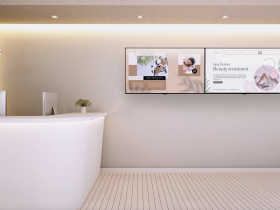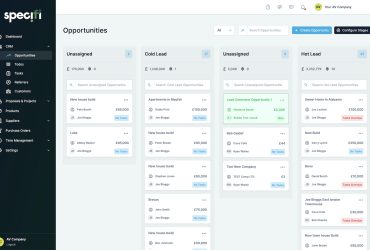I’m no stranger to doing DNA tests: I have done AncestryDNA and had a great experience with it. They are so many options, but I was intrigued when Nebula Genomics reached out with a particular angle for its whole genome sequencing beyond finding long-lost relatives: you can discover more about your genetic make-up and how it might play into everything from food intolerances to gut microbiome.
What is Nebula Genomics?
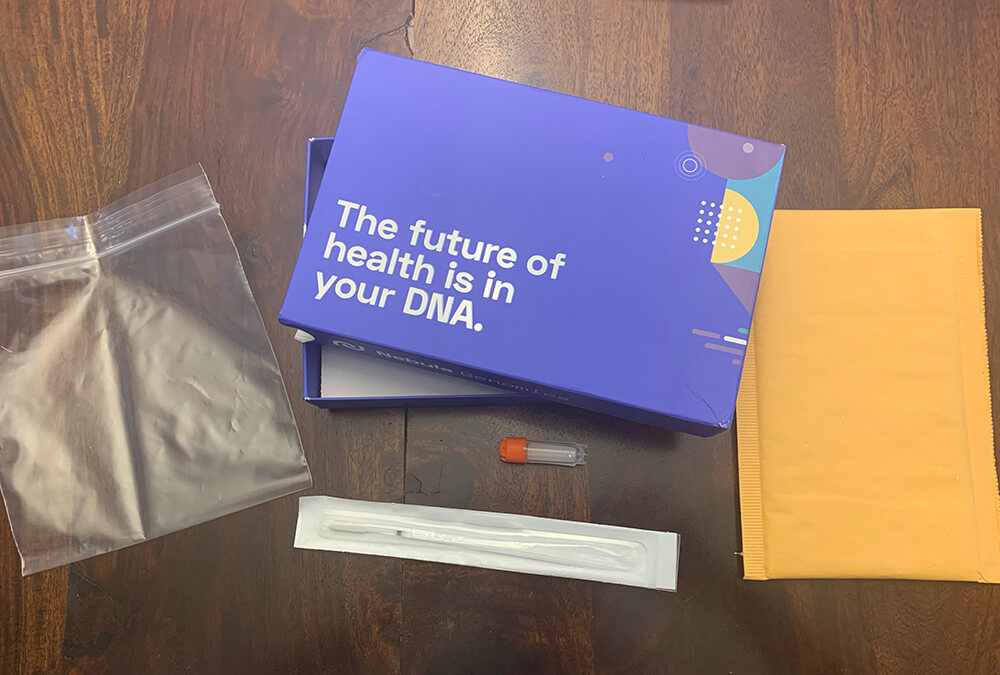
Started by George Church, a Professor of Genetics at Harvard Medical School and Professor of Health Science and Technology at Harvard University and the Massachusetts Institute of Technology (MIT), Nebula is designed to decode all your DNA. There are three tiered options: Standard, Deep, and Ultra Deep. The most popular option is Deep, which decodes up to 100GB of data based on 30x DNA sequencing depth. This includes decoding all 20,000 genes to identify common genetic mutations, rare genetic mutations, and deliver an oral microbiome report. Go a step further with the Ultra Deep whole genome sequencing that detects predispositions for just about anything, including rare genetic mutations. This makes it ideal for those who are curious if they might be predisposed to a particular genetic mutation that might be common among their family members, for example.
It’s not cheap: pricing is US$299 for the Standard (on sale at the time of this writing for US$99) that provides a basic ancestry report and detects common predispositions, US$999 for the Deep (on sale for US$299), and US$3,000 for the Ultra Deep (on sale for US$999).
The value is in the additional information beyond familial history. Nebula notes that gut health is trending these days, with people more often experiencing symptoms like bloating, upset stomach, and food intolerances. While people try everything from special shakes and pills to restrictive diets and programs to reduce symptoms or cut out potentially triggering foods, the truth is that a lot of these reactions are decided by genetics. “Your genes decide and regulate how many microbiomes are in your gut, which help digest food and produce molecules essential for life,” says Nebula.
The company quotes a University of Bristol’s international study, “Pioneering research reveals certain human genes relate to gut bacteria,” which states “specific changes in DNA – the chains of molecules comprising our genetic make-up – affected both the existence and amount of particular bacteria in the gut.” The study explains the identification of “13 DNA changes related to changes in the presence or quantity of gut bacteria.”
Presumably, then, by using the data discovered in a test like this one, you can leave the troublesome diets and gut health programs out of the equation and simply see based on genetics what foods are the likely culprits and which ones aren’t. Armed with that information, you can make positive lifestyle adjustments.
How it Works
Like with other DNA test kits, once you order and receive the kit, the first thing you need to do is register online. An identification number is noted on the test tube as well as on the instructions, which allows you to register with the anonymous data so your name is never attached to the results (though you do need to enter your e-mail address and gender when first registering).
Make sure not to eat, drink, or smoke for at least 30 minutes prior to taking the sample. Also make sure that you don’t try to gather a sample while sick from any type of bacterial or viral infection in your oral cavity.
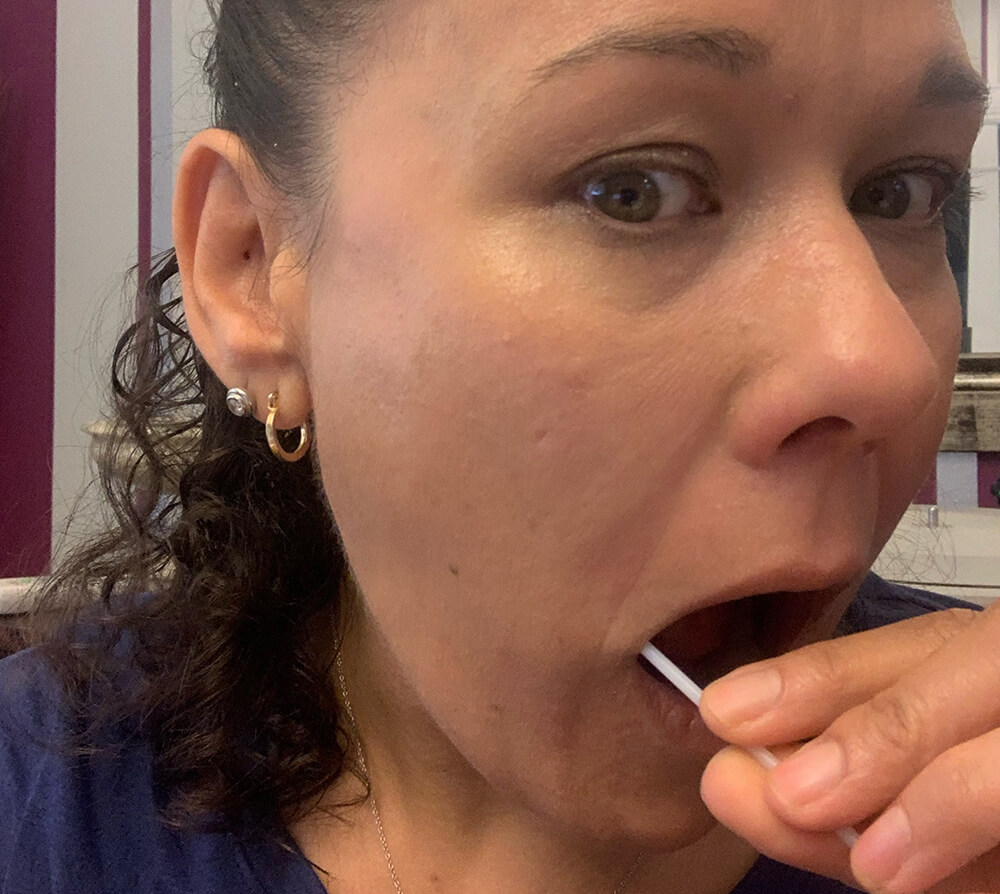
Once ready, take a sample from your cheek using the included swab. Nebula advises you to do this for a full 60 seconds while rotating the swab around your cheek to ensure it captures enough DNA. Once finished (I used a timer to ensure I did it for long enough), place the tip of the swab into the tube with the solution, snap off the bottom portion, put it into the biohazard bag, place it in the return envelope, and send it back to the company. An envelope with prepaid postage is included for buyers in the U.S., this isn’t the case for other countries, including Canada. I received a blank envelope but the instructions indicate the address for returning the sample (based in Houston, Texas). I provided the stamps and dropped everything off in the mailbox.
Within a few weeks, I received my results via e-mail. (Nebula notes that there are some delays in processing due to a backlog caused by COVID-19.)
The Results
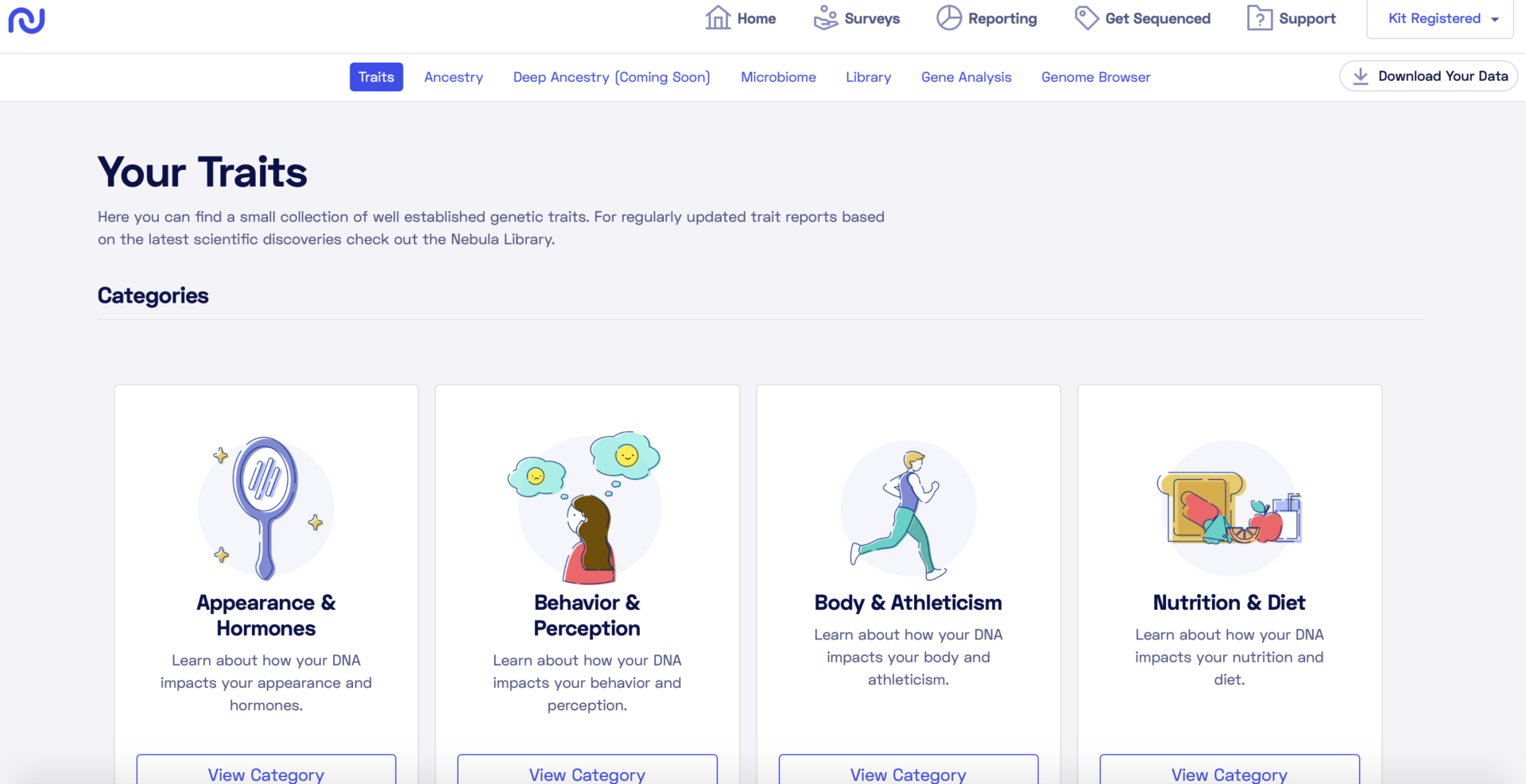
The sheer amount of detail in the results was overwhelming. I could spend weeks analyzing the data, reading the related reports, and Googling terms, from specific types of bacteria to various potential illnesses, going down a full rabbit hole if I so choose.
The results are divided into a different categories: traits, relating to appearance and hormones, behaviour and perception, body and athleticism, and nutrition and diet; ancestry; microbiome; and library, which indexes hundreds of reports to advise of your genetic predispositions to everything from PTSD to gallstones, dementia, glaucoma, walking pace, coronary artery disease, thyroid stimulating hormone, Alzheimer’s resilience, and much more.
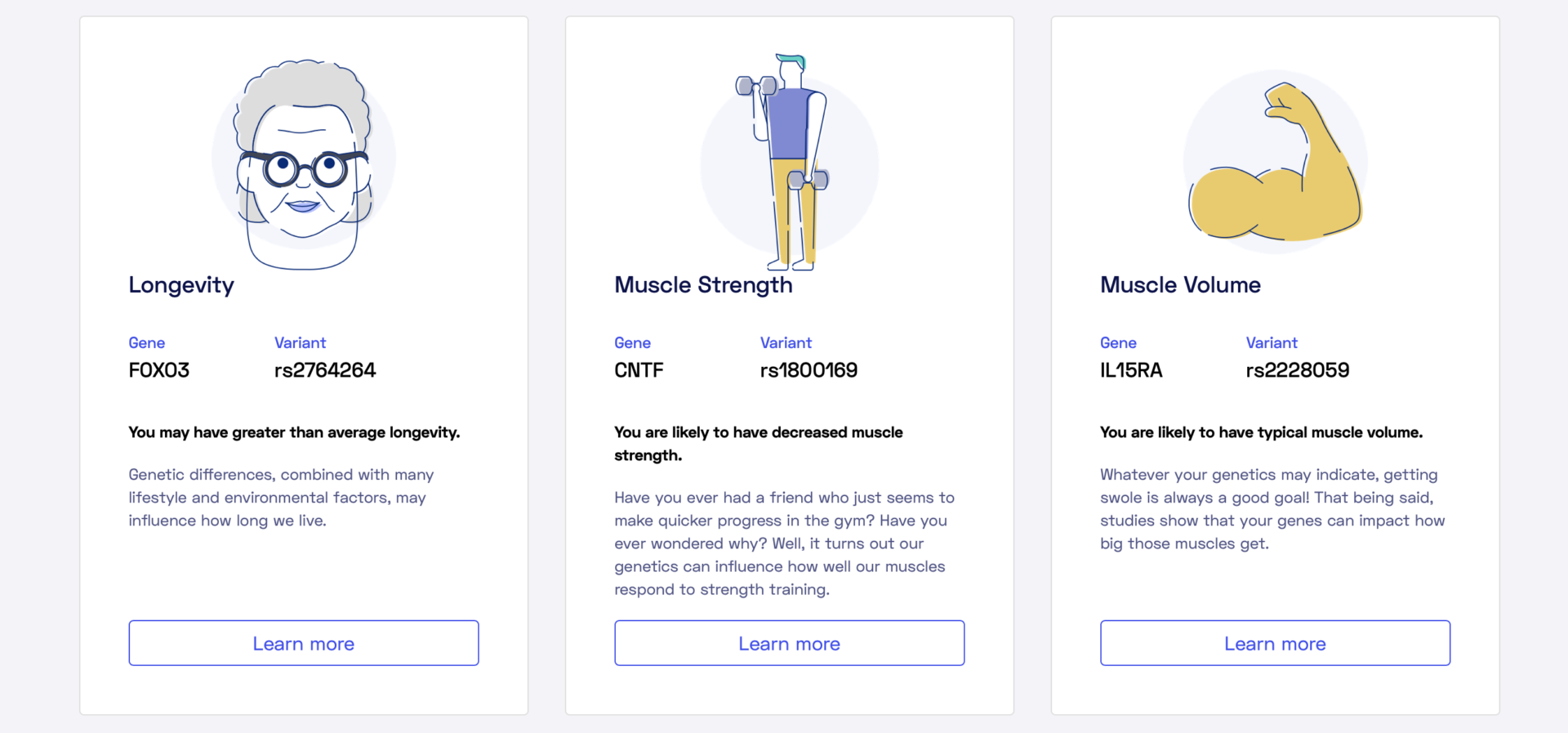
This is a good thing. You get tons of insight, although you may need some help making sense of it all. The results indicate where you fall based on a percentage scale with regards to different results. In some cases, the results are straightforward. For example, my genetic make-up suggests a high likelihood of near-sightedness (which I do indeed have).
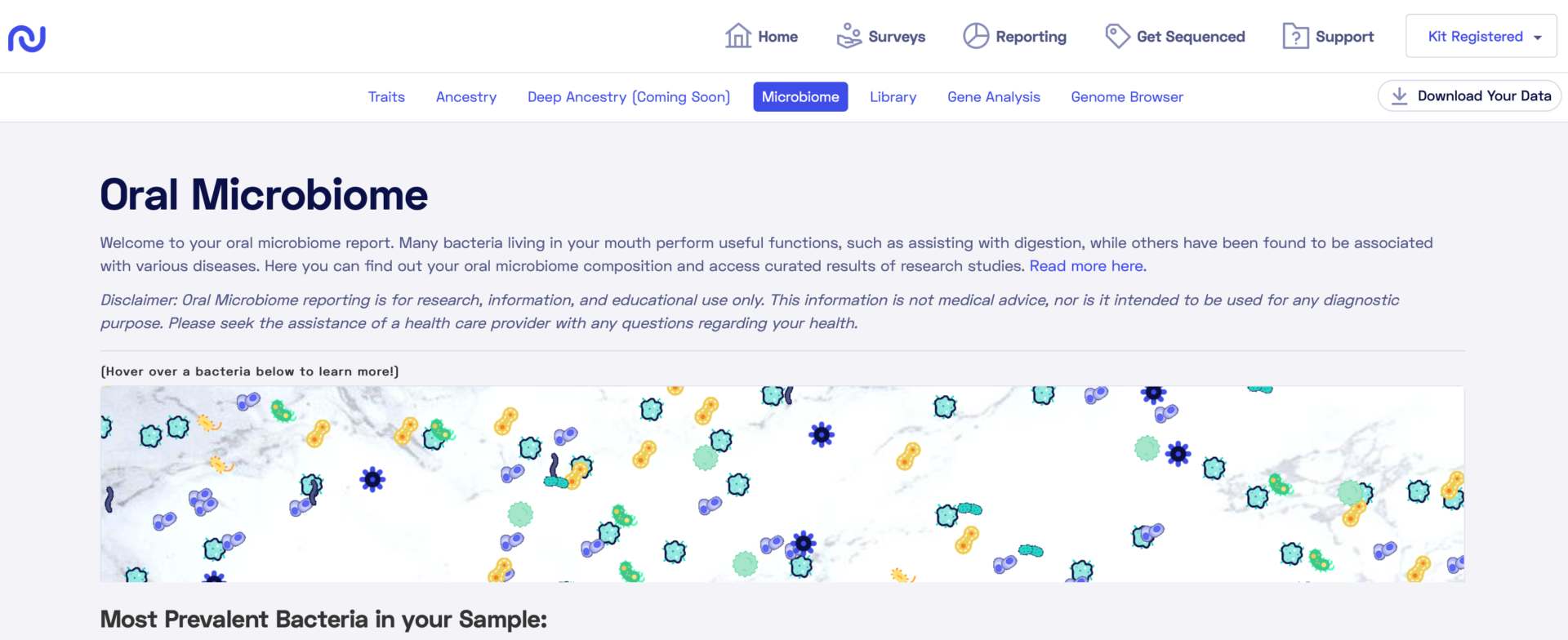
In others, however, the results can be confusing and even scary. Do I really have that much bacteria? Is that normal? And if I have increased levels of one over another, does it mean I’m more likely to get cancer? There needs to be a bit of work in dumbing down the data to make it more palatable to the average user who doesn’t possess a degree in medicine or science nor have the time to rifle through pages and pages of reports to try to make sense of it.
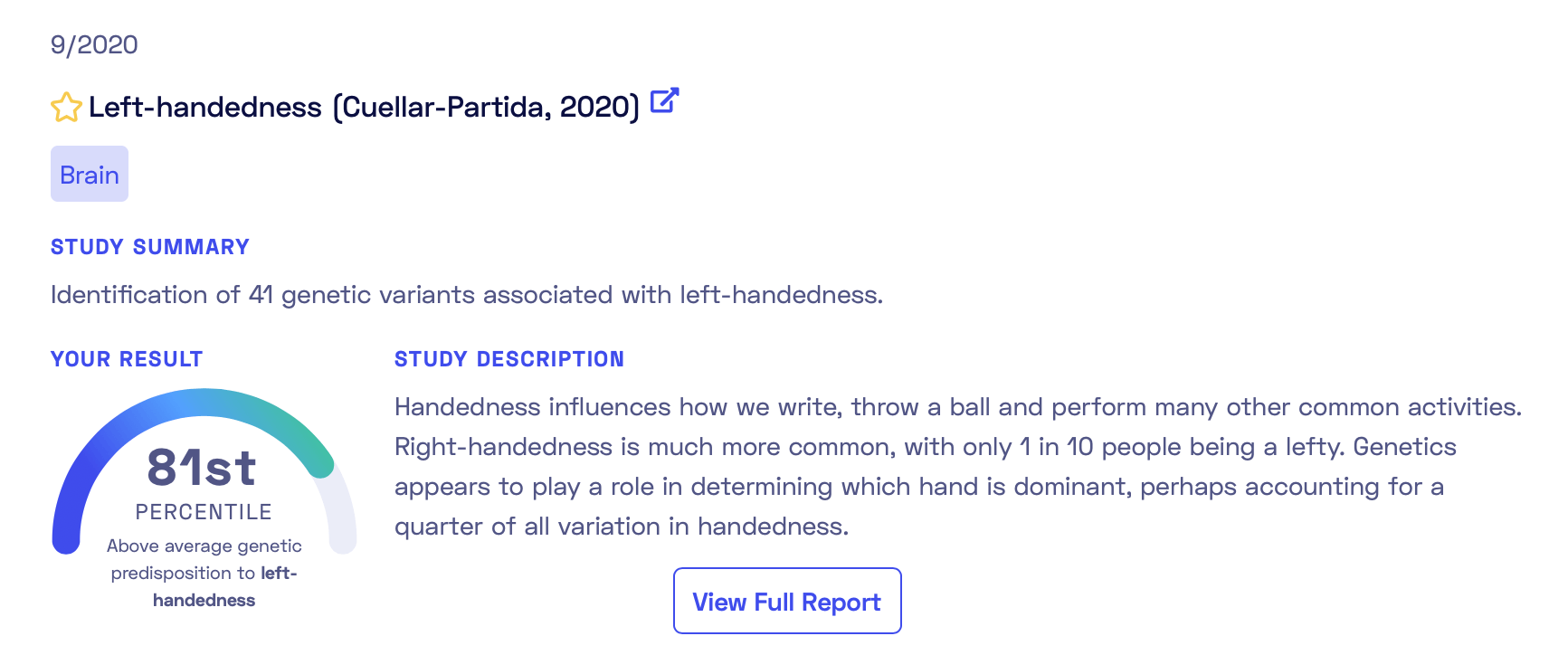
Nonetheless, I found a lot of the information to be thoroughly interesting. In some cases, it was right on the money, such as with the near-sightedness, the fact that I have a higher likelihood of being left-handed (I am), or even that I am likely to be lactose intolerant (I suspect this to be the case). In other cases, it was off: I love cilantro, though my genetic make-up suggests that I’m more likely to fall into the camp of people who swear it tastes like soap.
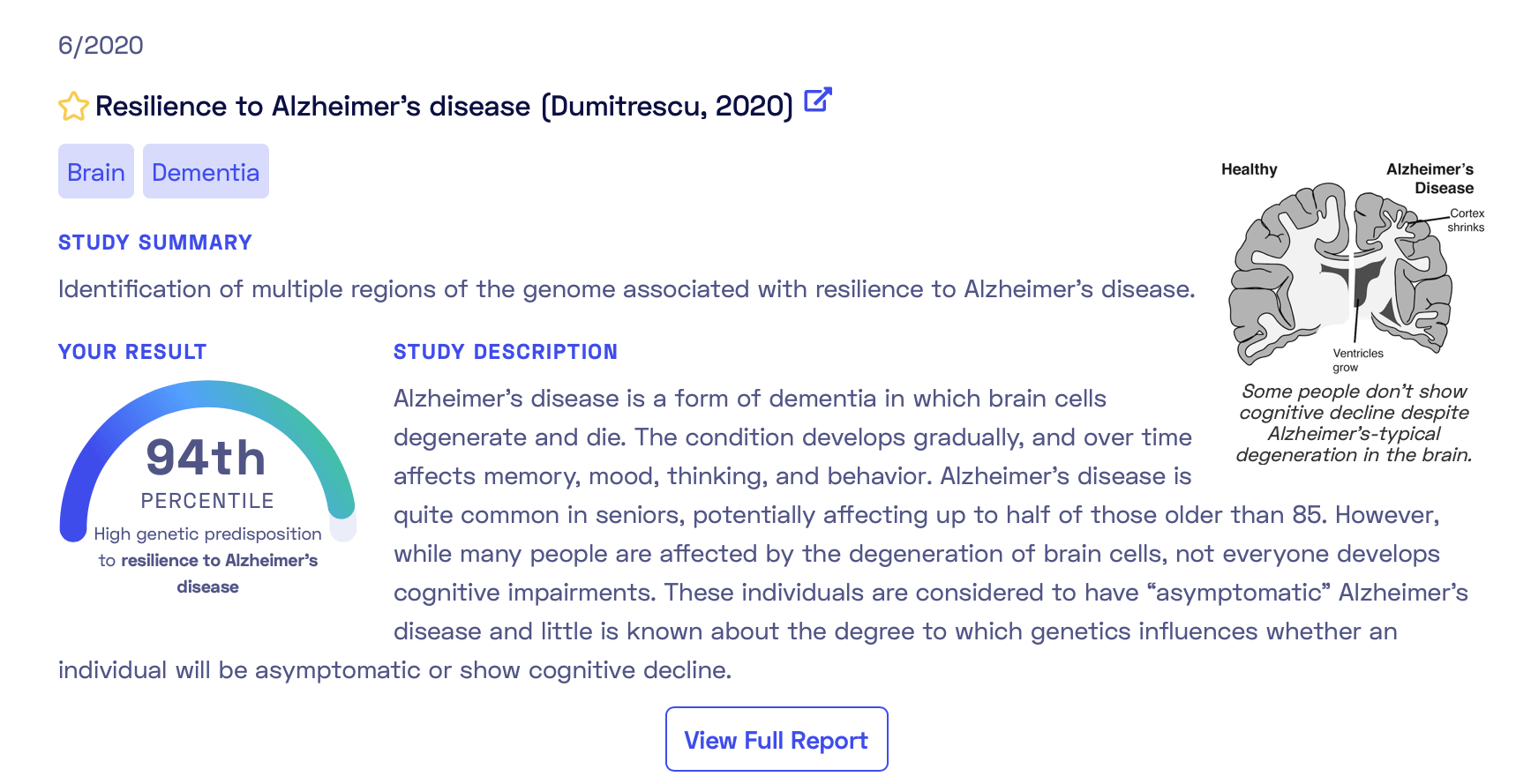
There is limited data available under traits, highlighting a “small collection of well-established genetic traits.” But when I entered library, there were 287 reports related to genetic markers found in my DNA. You can scroll through the entire list, type a search term, or use words from the tag cloud to get some ideas of what to look for, like genes related to addiction, diet, metabolism, prostate, skin, kidneys, and more.
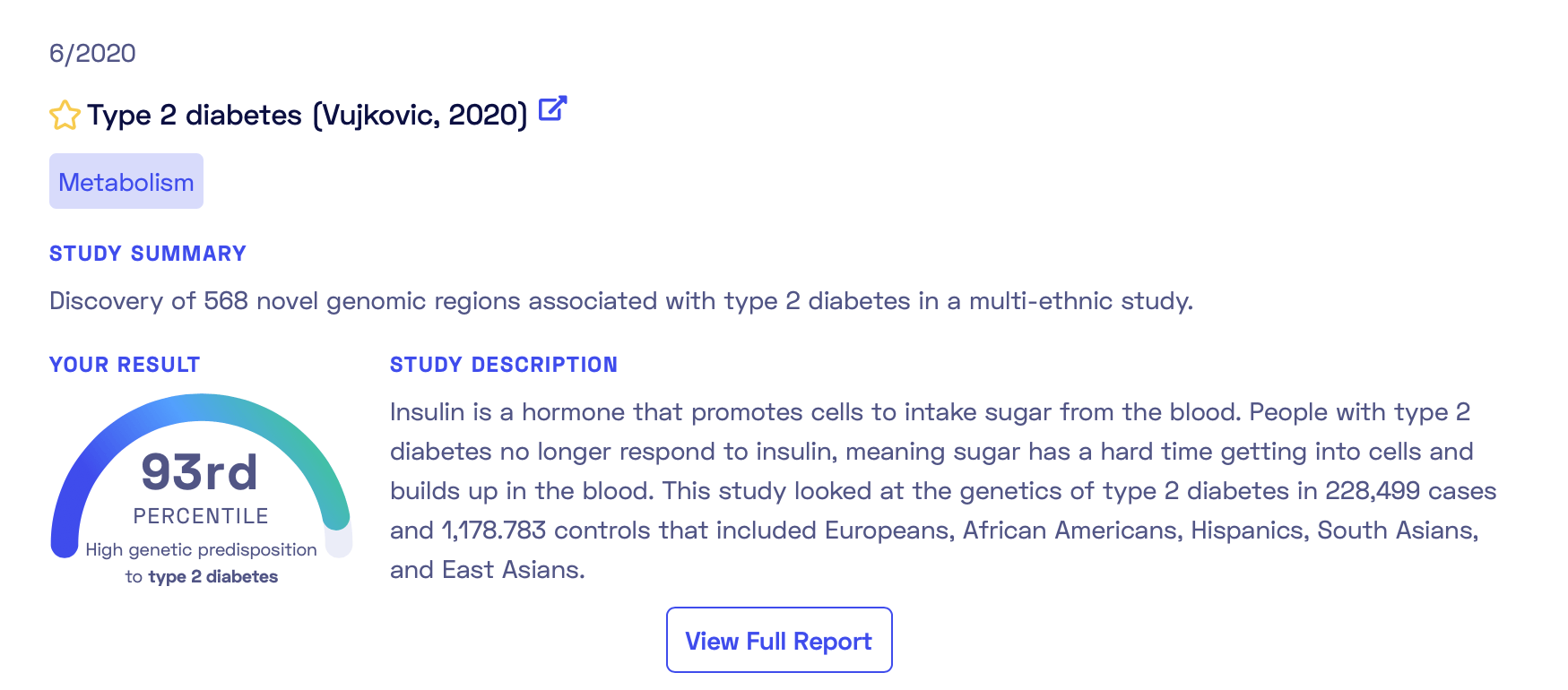
I learned that I have a high genetic predisposition to develop type 2 diabetes but also very high resilience to Alzheimer’s disease. I have a below average genetic predisposition to higher fat consumption and a high genetic predisposition to adolescent idiopathic scoliosis (a curvature of the spine, which I indeed have).
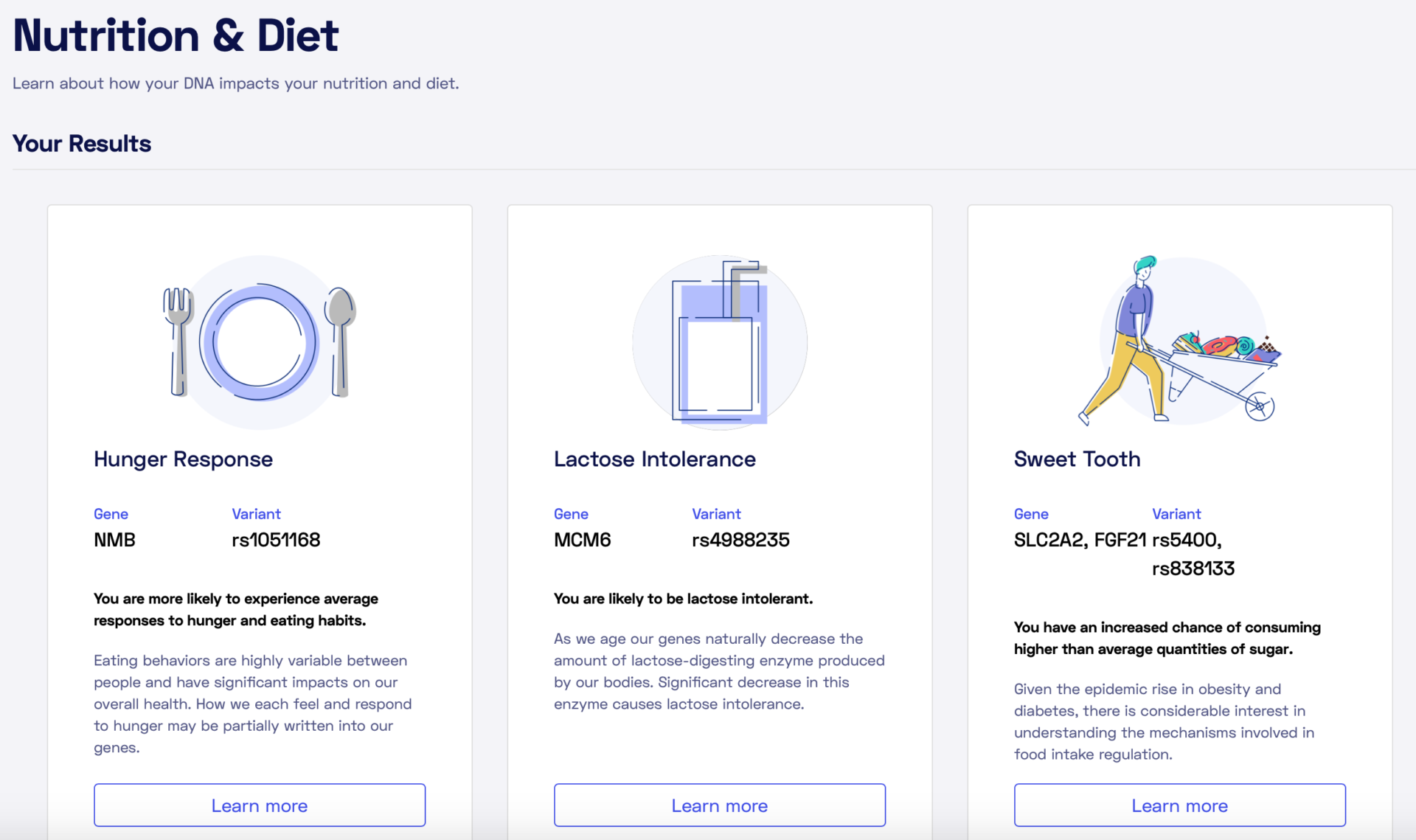
When it comes to ancestry, however, I found the results to be far less accurate, at least compared to other services that focus on and excel in that aspect of your DNA, like AncestryDNA. Knowing plenty of back details about my heritage from both my parents, my AncestryDNA results are far more likely to be accurate, right down to regions. The Nebula results seemed to be less accurate. While my mother’s side has Portuguese roots, for example, which AncestryDNA successfully determined, Nebula data pegged my heritage as being from Italy, which is not correct. This is likely due to the company not having as large a sample of users from which to go by and determine as accurate results.
How Nebula Handles Privacy
One of the biggest concerns with DNA tests is privacy and security: swabbing your cheek and providing a company with literally everything that makes you, well, you, is concerning. Are you putting power in the wrong hands?
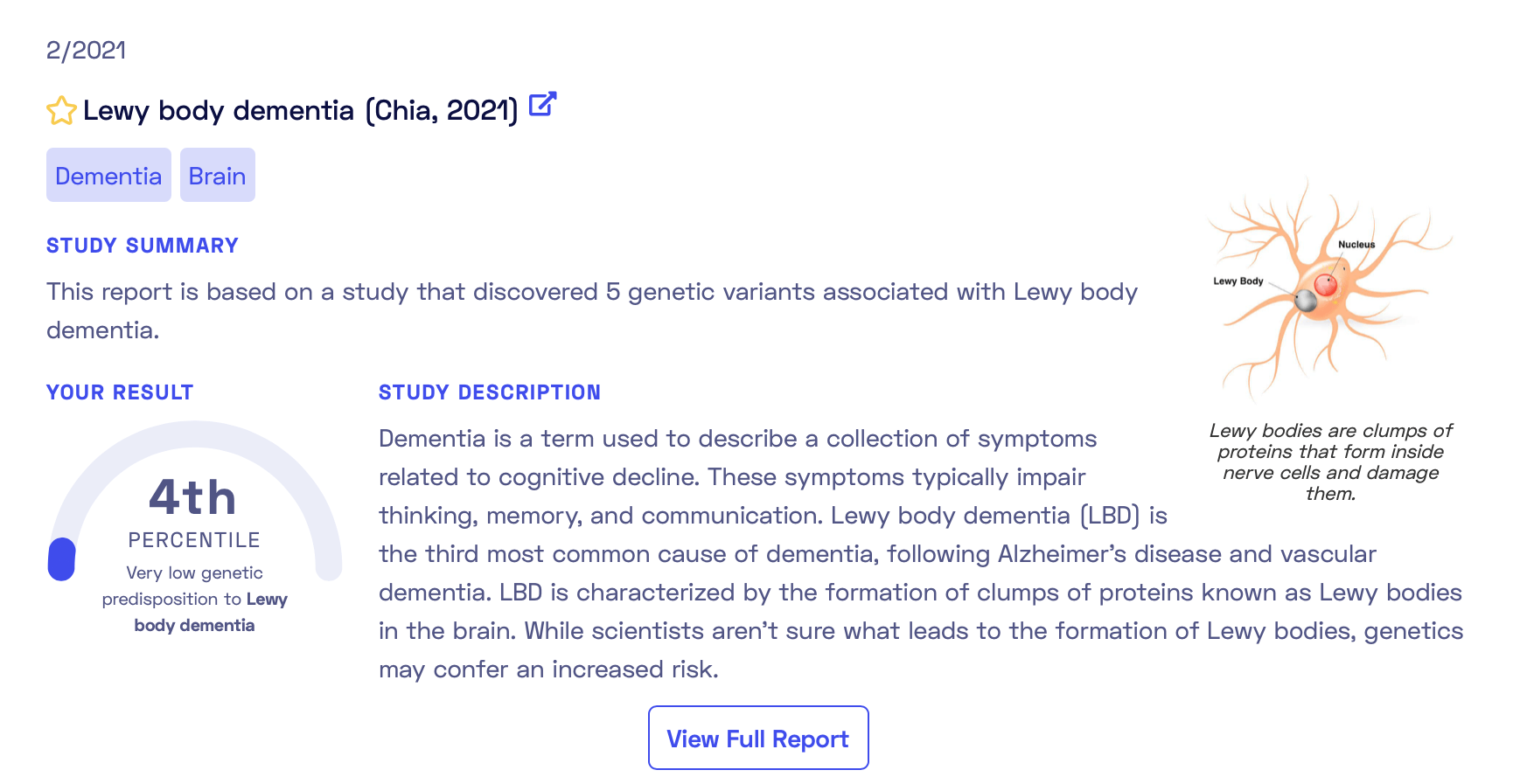
As noted, the testing process is anonymous, so once your sample arrives, it is known only as the eight-digit identification number label on the vial. Nebula gives customers “full control over your personal genomic data” and the company says it “continues to develop solutions for privacy-preserving genomic data analysis. This includes a blockchain-enabled multiparty access control system that doesn’t rely on any single part. This, says Nebula, helps reduce the risk of security breaches by hackers and prevents unauthorized government access. It also, says the company, protects against “data privacy infringements by genetic testing providers.”
Bottom Line
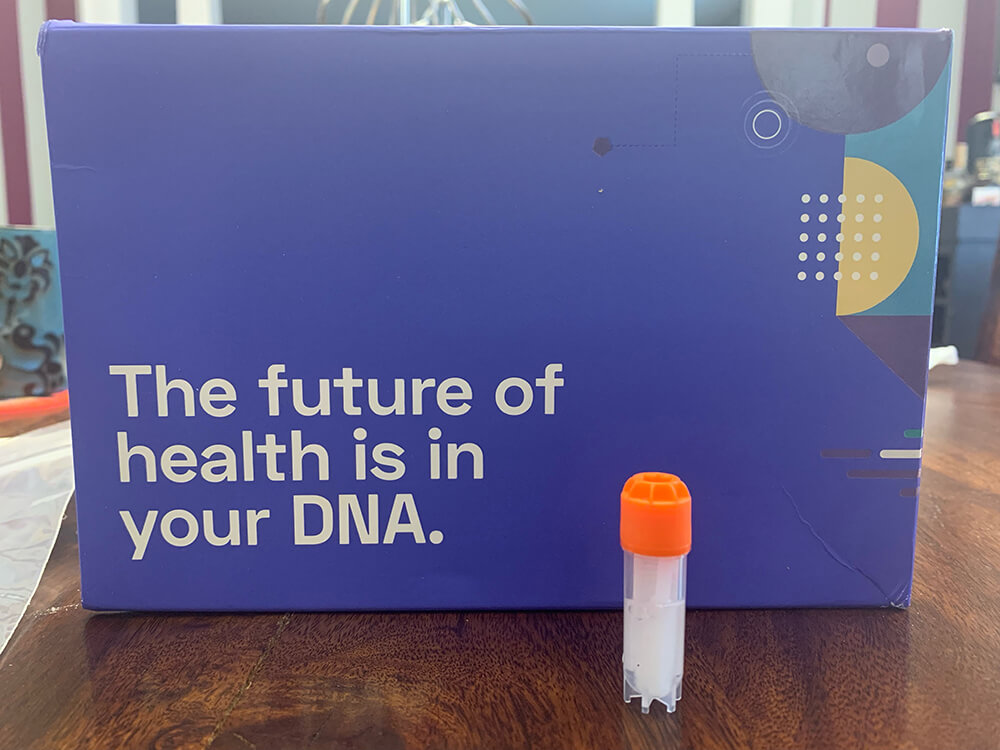
Overall, I was pleased with the sheer amount of data, though I yearned to sit down with someone who could explain it in further detail. With that said, I will likely return again and again to read more reports and gain more insight. It’s both an insightful and educational process, and if you have specific concerns about genetic predispositions to certain illnesses, food intolerances, or even habits, seeing how you fall on a percentage scale can help you curb an issue before it becomes one.
With that said, if you’re looking for a genetic test for ancestry and familial history, you’re better off going with a company like AncestryDNA or 24andMe. But for more drilled down data about your personal health and wellness, Nebula provides some great information to justify its high price. While some of the data is simply interesting information to share during watercooler chatter with other family members and friends, others can drive you to make positive changes to prevent or avoid everything from a gambling addiction to increased levels of anxiety.
Note that the test is not clinically validated and that the results are only for educational and research purposes. Do not use the results for diagnostic purposes, and always seek medical advice if you have any questions or concerns. It’s also worth noting that seeing some of the data can cause psychological distress, so if you tend to be triggered easily by such news about a high likelihood of an illness or health issue, you might want to steer clear of using the kit. Sometimes, ignorance is bliss. But in other cases, being armed with information can drive you to become the best possible version of yourself.





